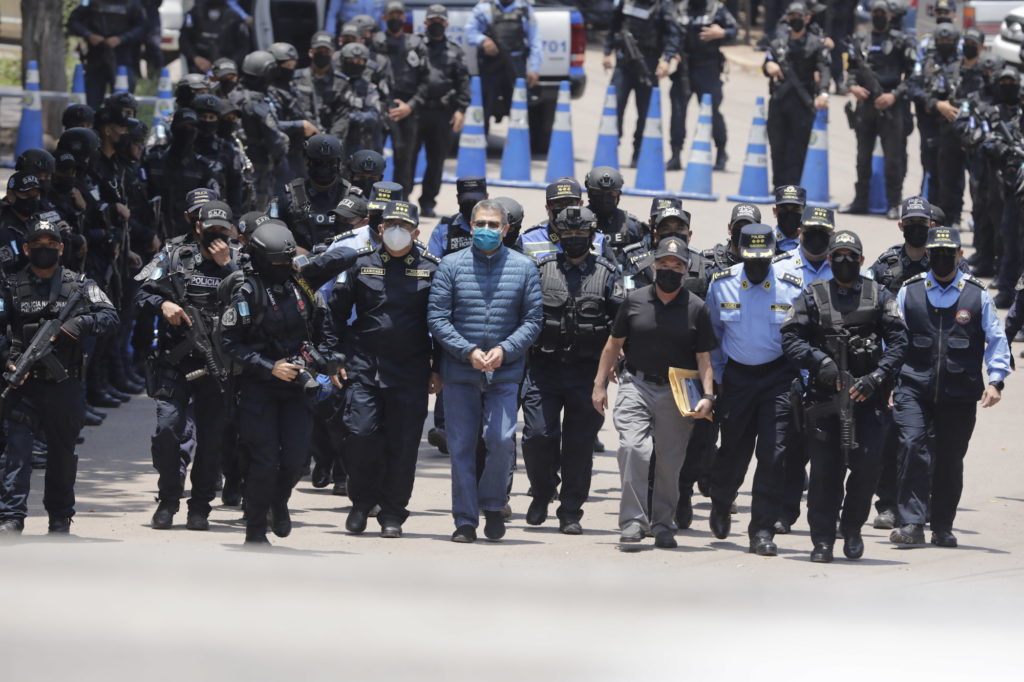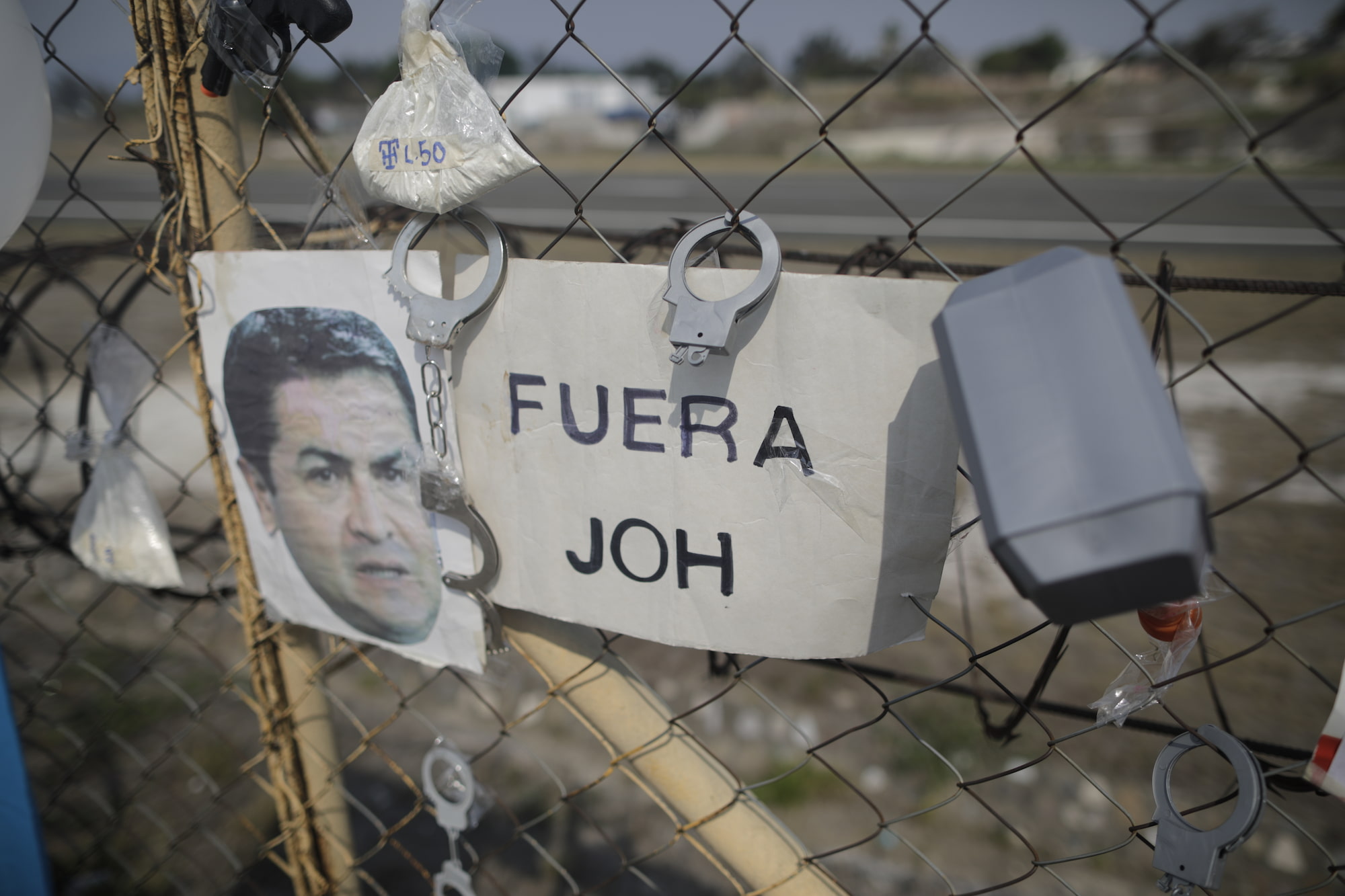Shortly after his extradition to the United States on a DEA plane, the United States District Court for the Southern District of New York released its indictment of the former president of Honduras. The indictment alleges that, in addition to drug trafficking and firearms possession, the former president received bribes from Mexican drug trafficker Joaquín “El Chapo” Gúzman, committed fraud in the 2013 and 2017 elections, and enlisted the support of other former presidents to facilitate drug trafficking in Honduras. A U.S. Justice Department judge remanded the former president in custody pending his hearing on May 10.
By María Celeste Maradiaga
Photos by Jorge Cabrera
April 6, 2022, the Constitutional Chamber of Honduras’ Supreme Court of Justice quashed former president Juan Orlando Hernández’s (known as JOH) last hope of avoiding extradition by declaring his final appeal inadmissible. For the next two weeks, the country waited anxiously for Hernández to be extradited to the United States.
Escorted by Security Minister Ramón Sabillón, Hernández was taken by police on April 21 from the Special Operations Command facility where he was being held to a helicopter that would transport him to the Hernán Acosta Mejía Air Force base in Tegucigalpa. While this was happening, Hernández’s wife, Ana García Carías, posted a video on social media of her husband saying, “I am innocent. I am a victim of injustice.”
Hernández is scheduled to appear in the Southern District Court of New York on May 10 to enter a guilty or innocent plea. Raymond Colón, one of the former president’s defense attorneys, said that Juan Antonio “Tony” Hernández could be called by the prosecution to testify against his brother.
The U.S. Drug Enforcement Administration (DEA) plane landed at Hernan Acosta Mejía Air Force Base at around 1:20 p.m. A crowd had gathered in front of Toncontin International Airport in Tegucigalpa, located next to the air force base, and as the DEA plane took off for the United States an hour later, the crowd hugged and shouted, “JOH is gone! We did it! Juanchi is gone!”
“This is a warning for other government officials to clean up their acts because the Honduran public is watching them,” said Rody Medina, who waited for more than an hour to watch the plane take Hernández to the United States.
Others in the crowd remembered fallen friends and family. Jessica Castillo demanded justice for the martyrs and victims of the Hernández regime. Castillo held up a sign bearing the name of Tomás Enrique García Castillo, her brother who was killed while protesting the 2009 coup. “Keep on fighting!” she shouted through a megaphone.
Attorney and human rights expert Joaquín Mejía Rivera said that over the last 12 years, Hernández turned Honduras into a narco-dictatorship and an autocracy in which he controlled all of the country’s institutions.
“This was evident in the alarming deterioration of the human rights situation in Honduras as a result of structural impunity, widespread corruption, and a selective justice system that moved slowly to address human rights violations and favored those connected to the country’s political, economic, and business elites,” said Mejía.
Joaquín Mejía says that Hernández’s narco-dictatorship and autocratic regime resulted in an alarming deterioration in the country’s human rights situation.
Mejía cited a report by the United Nations High Commissioner for Human Rights (OHCHR) on the human rights landscape in Honduras in 2021, that claims, “There was no significant progress in the investigations into alleged human rights violations that occurred during the 2009 coup d’état and the events following the 2017 election.” The OHCHR report also expressed concern regarding the dismissal of two cases of violent deaths that occurred during protests of the 2017 electoral fraud.
After the plane carrying Hernández left Honduran air space, U.S. Attorney General Merrick Garland held a press conference in Washington D.C. in which he alleged that Hernández abused his position to operate the country as a “narco-state,” used drug money to finance his electoral campaigns and buy votes, and facilitated the importation of 500,000 kilograms of cocaine to the United States.
Garland also alleged that Hernández corrupted legitimate public institutions in the country — including parts of the National Police, armed forces, and the National Congress. He reiterated that the Justice Department is committed to disrupting the entire ecosystem of drug trafficking networks that harm people in the US, and will take a comprehensive approach to protect the country’s communities from violent crime.
U.S. Attorney Damian Williams said that Hernández is alleged to have used his vast political powers to protect and assist drug traffickers and cartel leaders by alerting them to possible interdictions and allowing his country’s armed forces to support their drug trade.
Political analyst Josué Murillo believes that Hernández’s extradition to face charges by the U.S. Department of Justice divides Honduran history into a clear “before” and “after,” and sends an unmistakable message to the region’s political leaders.
“The United States has just played a key card in its geopolitical strategy, and especially in its fight against corruption, drug trafficking networks, and organized crime,” said Murillo.
Murillo says that political parties in Honduras must reshape, renew, and revitalize themselves so that they align with the needs of the people. He also believes that the justice system must be restored, as it failed to respond to Hernández’s offenses.
“This shows how the Honduran justice system served the specific interests of that [the Hernández] family,” said Murillo.
It’s important to recognize that the former president didn’t act alone during all that time, as people in the business sector, civil society, and many religious leaders were accomplices in the Hernández regime’s criminal activity, Murillo argued.
The charges
According to the U.S. Justice Department’s indictment, around 2005, Hernández, who was then a legislator running for reelection, accepted approximately US$40,000 in drug-trafficking proceeds from Victor Hugo Díaz Morales, also known as “El Rojo.” In 2009, Hernández began campaigning to become president of the Honduran National Congress and accepted approximately US$100,000 from Díaz Morales in drug money, which helped Hernández win the post.
The indictment also charges that between 2004 and 2016, in return for the bribes paid to Hernández, Diaz Morales received sensitive information about law enforcement and the military in Honduras that was critical to his drug-trafficking organization. This information described operations of the Honduran Navy; efforts by the United States to train Honduran Air Force pilots to conduct anti-narcotics operations; and Honduran military radar capabilities, so that cocaine plane shipments could avoid detection. During this time, Díaz Morales and Tony Hernández worked together to transport approximately 140,000 kilograms of cocaine through Honduras to the United States.
In 2009, Hernández’s political ally, Porfirio Lobo Sosa began his campaign to become president of Honduras. The indictment alleges that around that time, Hernández and Lobo Sosa worked together to obtain approximately US$2,000,000 in drug-trafficking proceeds from Amilcar Alexander Ardon Soriano, also known as “Chande.” Ardon Soriano is a former Honduran drug trafficker and was mayor of El Paraiso, Copan at the time. In exchange, Hernández and Lobo Sosa promised to protect Ardon Soriano from arrest and extradition to the United States.
In 2013, Hernández began his own campaign to become president of Honduras. The indictment charges that Hernández accepted approximately US$1,000,000 from Joaquín “El Chape” Guzman in exchange for a promise to continue protecting the Sinaloa Cartel’s drug-trafficking activities in Honduras. Working with the Sinaloa Cartel in Honduras was the Valle Valle Cartel, led by brothers Miguel and Luis Valle, who were in constant communication with Tony Hernadez and Chande Ardon.
The Hernández indictment alleges that in the lead-up to the Honduran presidential election, Hernández bribed election officials to manipulate the voting process in his favor.
The U.S. Justice Department indictment charges that Hernández used drug money to finance his two presidential campaigns and commit election fraud in 2013 and 2017.
According to the indictment, Hernández is not only accused of transporting cocaine to the United States but also of manufacturing it, and of showing interest in using a drug lab near a Honduran seaport owned by drug smuggler Geovanny Fuentes Ramírez. Hernández allegedly told Fuentes Ramírez that he was going to “stuff the drugs right up the noses of the gringos.” That conversation between Hernández and Fuentes Ramírez also came up in the latter’s 2021 trial.
In February 2022, Fuentes Ramírez was sentenced to life in prison for cocaine importation, plus 30 years for weapons-related crimes. In his trial, Fuentes Ramírez testified that Hernández had access to his drug lab in the department of Cortés and that the former president had given him suitcases full of money.
In 2017, Hernández was campaigning to be elected to an unconstitutional second term as president of Honduras. Concerned about his prospects for victory, Hernadez met with Ardon Soriano and asked him to finance his campaign activities in the departments of Copan and Lempira in exchange for continuing to protect Ardon Soriano from arrest and extradition. Ardon Soriano agreed and provided approximately US$1.5 million in drug money.
The indictment against Hernández explicitly states that Geovanny Fuentes gave the former president approximately US$25,000 to shield his drug trafficking from investigation by the Honduran justice system. The indictment also alleges that while his brother Tony was awaiting trial, Juan Orlando Hernández (an alleged co-conspirator of his brother) continued to meet with drug traffickers in Honduras, including Fuentes Ramírez, with whom he met on May 29, 2019, at the Presidential House.
The forfeiture demands that Hernández forfeits to the United States all property obtained as a result of the offenses charged in the indictment. If these assets have already been sold or transferred, the United States claims the right to seize other assets owned by the former Honduran president. If found guilty, Juan Orlando Hernández could face three life sentences in a U.S. prison.
The government’s role after JOH’s extradition
Human rights lawyer Joaquín Mejía believes that despite Hernández’s extradition, Honduras still has a big challenge ahead of it since the former president was just the visible head of a large criminal structure that turned the country into a dictatorship.
“The criminal structure is still intact after the extradition, and the National Police, the armed forces, the judicial system, and the Ministry of Justice are all part of it. This is the enormous challenge that our country faces,” said Mejía.
He is concerned about the budget allocations for the armed forces, the Ministry of Security and the Ministry of Defense included in the new national budget. “The budget allocated for social development is a very good and positive step,” said Mejía, adding, “But it’s not a good idea to allocate so much money to the armed forces without any accountability measures. According to Kevin Castel [Senior United States District Judge for the Southern District of New York], the Honduran armed forces provided security for drug traffickers and allowed cocaine trafficking through Honduran territory. I think it’s time for the Honduran people to demand a national dialogue on the role that the armed forces should play in Honduran society, because, ‘The armed forces is the biggest nightmare for democracy in Honduras,’ to quote Victor Meza.”
Josué Murillo says that if either Hernández or former National Police Director Juan Carlos “El Tigre” Bonilla (also in process of extradition), decides to confess, they could reveal damning information about the corruption that permeates private enterprise, civil society, labor unions, and other Honduran institutions.
“It’s important for us to watch this trial, as it could provide a lot of direction for the new International Commission Against Impunity in Honduras (Comisión Internacional Contra la Impunidad en Honduras – CICIH). In addition, our newly appointed judges and prosecutors must act to protect the interests of the Honduran people,” said Murillo.









